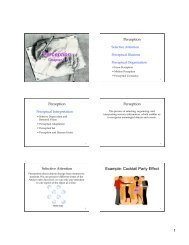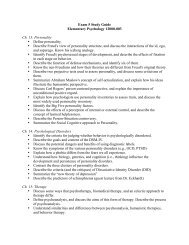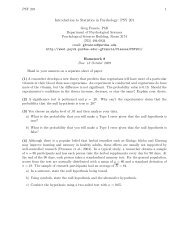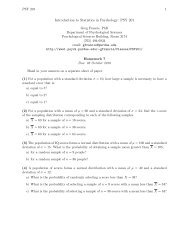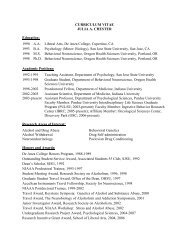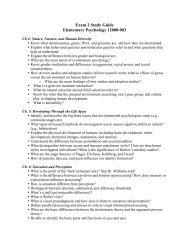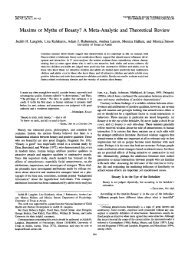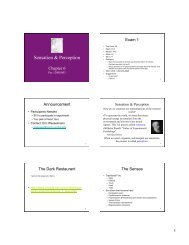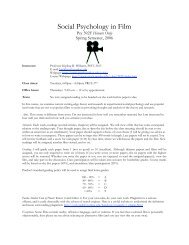Introduction to Cognitive Psychology - Department of Psychological ...
Introduction to Cognitive Psychology - Department of Psychological ...
Introduction to Cognitive Psychology - Department of Psychological ...
You also want an ePaper? Increase the reach of your titles
YUMPU automatically turns print PDFs into web optimized ePapers that Google loves.
Greg Francis 1/7/11Problem solvingPSY 200Greg FrancisLecture 34What does that “aha” feeling mean?Purdue UniversityProblem solving!! A hallmark <strong>of</strong> intelligence!!<strong>of</strong>ten used as a definition <strong>of</strong> intelligence!! Seem <strong>to</strong> get something from nothing!! We will not explain exactly how it happens!!but we can look at some characteristics <strong>of</strong>problems and problem solving»!what makes for an easy (or hard) problem?»!what makes for a good (or bad) problemsolver?Purdue UniversityTopics!! We will look at a number <strong>of</strong> fac<strong>to</strong>rsthat influence our ability <strong>to</strong> solveproblems!!expertise!!analogy!!set effects»!priming»!incubation»!functional fixedness!!insightPurdue UniversityExperts!! Some people learn how <strong>to</strong> solve particulartypes <strong>of</strong> problems!! What makes an expert different from anovice?!! Experts know how <strong>to</strong> describe problems!!other than that, there seems <strong>to</strong> be n<strong>of</strong>undamental difference (even for geniuses!)Purdue UniversityAn example <strong>of</strong> experts!! Chi, Fel<strong>to</strong>vich & Glaser (1981)!! Take second year physics students (novices) and ask them <strong>to</strong>classify a bunch <strong>of</strong> physics problems!! they tend <strong>to</strong> group them by surface similaritiesAn example <strong>of</strong> experts!! Have experts (PhDs) classify the sameproblems!!grouped according <strong>to</strong> how <strong>to</strong> solveExpert 2: “Conservation <strong>of</strong> energy”Novice 2: “Angular velocity; momentum, circular things”Novice 3: “Rotational kinematics, angular speeds, angularvelocities”Novice 6: “Problems that have something rotating, angularspeed”Novice 1: “These deal with blocks on an inclineplane”Novice 5: “Inclined plane problems, coefficient <strong>of</strong>friction”Novice 6: “Blocks on inclined planes with angles”Expert 3: “Work-energy theorem. They are allstraight-forward problems.”Expert 4: “These can be done from energyconsiderations. Either you should know the principle<strong>of</strong> conservation <strong>of</strong> energy, or work is lostsomewhere.”Expert 2: “These can be solved by New<strong>to</strong>n’s second law”Expert 3: “F=ma; New<strong>to</strong>n’s second law.”Expert 4: “Largely use F=ma; New<strong>to</strong>n’s second law.”Purdue UniversityPurdue UniversityPSY200 <strong>Cognitive</strong> <strong>Psychology</strong> 1



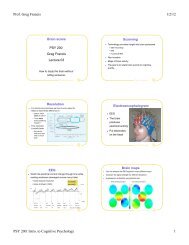

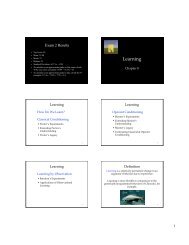
![Exam 4 Study Guide[1]](https://img.yumpu.com/45196739/1/190x245/exam-4-study-guide1.jpg?quality=85)
